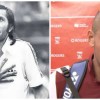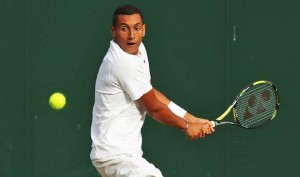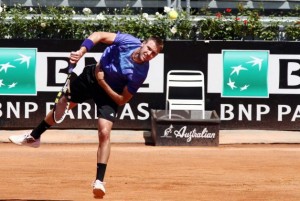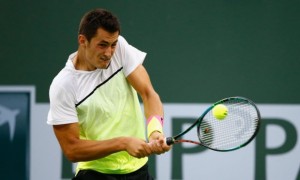By Randy Walker
@TennisPublisher
It’s now official. Nick Kyrgios is this generation’s “bad boy” of tennis.
The out-spoken and eccentric Australian has been part of a growing list of controversies, the latest being audible comments about Stan Wawrinka and his girlfriend during their match in Montreal, as documented here: http://www.bbc.co.uk/newsbeat/article/33906218/tennis-star-nick-kyrgios-caught-making-obscene-accusation-in-montreal
One of the first things I thought of in light of this latest hullbaloo is that Kyrgios could well be this generation’s version of Ilie Nastase.
There are many stories about the obscenities and crude comments and actions made by Nastase in his day. A simple google search will uncover a few. Cliff Richey, in his book “Acing Depression: A Tennis Champion’s Toughest Match” (for sale and download here: http://www.amazon.com/dp/0942257669/ref=cm_sw_r_tw_dp_01kZvb1FSEXVZ) discusses a few dust-ups and antics pulled by the man Hall of Fame journalist Bud Collins called “The Buffon of Bucharest.”
“The most notorious Bad Boy of us all was without question Ilie Nastase,” wrote Richey in his chapter on the most ill-behaved tennis players of his era. “His nickname was “Nasty” because of the dirty tricks he pulled.”
“Nastase used to mock me and really play to the crowds,” Richey also wrote. “He made fun of the grunting and groaning sounds I made when I hit a ball. He got the crowd to start laughing at me.”
Richey said he remembered a match where he wore a T-shirt with a picture of the infamous middle finger under his regular collared shirt, lifting it and showing it to the crowd when they got mad with him.
“He was literally saying “F you” to the crowd!” Richey wrote. “I really think Nastase enjoyed the carnival atmosphere more than anything else. I think that was his way of escaping the pressure. He would take a situation and make it into something he felt more comfortable with. That way he could pretend he was in control. He won the French Open and the U.S. Open that way. He was known as the Clown Prince of Tennis.”
Richey recounted two crazy circumstances in matches with Nastase as excerpted from “Acing Depression” below.
The occasion I remember the most came when he taunted me in Paris at the Masters in December of 1971. He had the crowd on his side, outright laughing at me. He was mimicking the way I acted. He turned it into a complete sideshow.
When I got off the court, I went into the locker room. I asked Zeljko Franulovic, “When a guy pulls something like that, what are you supposed to do?” He said, “You should have jumped the net and attacked him.” I was always known as a bit of a bad boy, but I never did anything like that!
In January of 1972, a few weeks later, we played a tournament at the Royal Albert Hall in London. Clark Graebner played Nastase in the semis and I played the other semifinal match against Lew Hoad. Graebner did not like the way Nastase was acting and actually crossed the net to get in Ilie’s face in a threatening manner and said, “You will not treat me the way you treated Richey in Paris!”
All of a sudden, Nastase defaulted the match. When reporters asked why, he said, “Graebner frightened me.” In instances like that, yeah, man, you bet—you really do feel like you’re being thrown to the lions.
Nastase is still a good friend of mine, but there was a time when we didn’t speak to each other for a full year. During one match we played, the base linesman called a foot fault on his serve. Nasty kicked his shoe off at the linesman. I was waiting for him. He pretended that he couldn’t untie the knot to get his shoe back on.
I finally said to the umpire, a guy named Hague Twofink, “I’m not putting up with this. The rule says ‘continuous play.’ I’m claiming the match.”
I took all my stuff and went back to the locker room. I already started talking to reporters about claiming the match. My host that week, Bernie Koteen, came to get me and said, “You’d better go out there. They’re about to default you.”
So I went back out on the court and told Twofink, “I’ll play, but his foot fault stands. He only has one serve left. If he doesn’t put the ball in play within 10 seconds, I’m leaving. I don’t care who you give the match to.”
Twofink agreed. He announced that Nastase would have 10 seconds to serve. Nastase refused. The crowd started counting down: “10, 9, 8,” etc. Nasty never put the serve in play and was defaulted.





